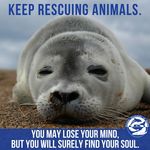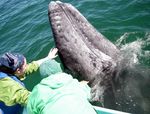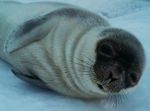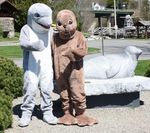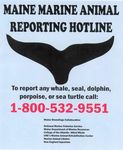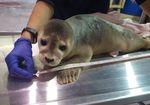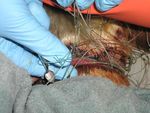New Volunteer Training - Marine Mammals of Maine
←
→
Page content transcription
If your browser does not render page correctly, please read the page content below
Marine Mammals of Maine
◼ 501(c) 3 nonprofit
◼ To provide response, assistance and care for
stranded marine animals and to work collaboratively
with similar organizations to aid in the protection
and support of marine animals as defined by the
Marine Mammal Protection Act. To provide public
education and research about marine animals and
the environment.◼ Non-profit with 2 staff and a board of directors
◼ ~80 dedicated, passionate volunteers
◼ Cover Kittery to Rockland Maine
◼ ~2,500 miles of coastline!
◼ Respond to ~300 marine mammals and
sea turtles annuallyOrganization Programs ◼ Marine Mammal Response ◼ Triage/Rehab ◼ Volunteer ◼ Outreach ◼ Fundraising ◼ Research
Legal Authorization
Marine Mammals of Maine
Volunteers
◼ Authorization from NMFS is required to approach
marine mammals for any reason
◼ Volunteers must have permission from MMOME
prior to responding to each strandingMarine Mammal Protection Act
◼ All Marine Mammals are protected under the Marine
Mammal Protection Act of 1972
◼ The MMPA makes it illegal to feed, harass, capture, or
kill marine mammalsThreats to Marine Mammals ◼ Are largely from human impacts, including accidental capture in fishing gear, habitat destruction, poaching, pollution-marine debris, harassment, and ship strikes
Statewide Reporting Hotline
Maine Strandings Collaborative
◼ Maine Marine Animal Reporting Hotline
◼ 1-800-532-9551
◼ To report any whale, seal,
dolphin, porpoise,
or sea turtleCurrent Maine Groups
◼ College of the Atlantic (Allied Whale), Bar
Harbor
Responds to live and dead marine mammal and sea
turtle strandings from Rockland to the Canadian
border
◼ Marine Mammals of Maine
Responds to live and dead marine mammal from
Kittery to Rockland, temporarily stabilizes sealsNortheast Regional Stranding Network (Maine to Virginia)
What is a Stranding?
◼ Dead:
◼ on a beach or shore of the US
◼ in waters under the jurisdiction of the US (out to 3
miles)
◼ Alive:
◼ unable to return to the water
◼ in apparent need of medical attention; or
◼ in the water, but unable to return to its natural habitat
under its own power or without assistanceStranded Animals of Maine
◼ Cetaceans ~
◼ dolphins
◼ whales
◼ porpoises
◼ Pinnipeds - 4 species
◼ true/earless sealsNortheast Pinnipeds Harbor Seal Gray Seal Harp Seal Hooded Seal
Harbor Seals Phoca vitulina -Males and Females look the same -Pups and adults have similar coat patterns -Up to 5’ in length & 250lbs -Mottled spotting, small head with eyes equidistant between ear and nose. -Nostrils appear to form a “V” -Pups born in May off the coast of Maine
Harp Seals
(Pagophilus groenlandicus)
Pups-
Born with linugo
coat
3 feet/24 lbs
White/yellow coat
Beater-
25 days-1 yearJuvenile harp seals vs harbor seals-
tricky to differentiate at times!
Which 2 photos are harp
seals? Which photo is a
harbor seal?Hooded Seal (Cystophora cristata)
Adults
-Characteristic nasal
flap/ “hood”
-Males up to 8.5 ft, 700
lbs Pups
-Females up to 7 ft, 600 Blue Back
lbs ~3 feet at birth/50 lbs
-Largest, and most Shed this coat at 14
aggressive species we months
deal with -Shortest nursing
-Can go catatonic period of any mammal
species, 3-5 daysGrey Seals (Halichoerus grypus) -Year round residents in the GoM -Their pupping season is what puts them in our ice-seal category -Range extends from eastern Canada and the northeastern United States -Social species that will haul out and sometimes hunt in groups -Can be aggressive, particularly adults
Seal Natural History
get familiar with these, and prepare to repeat
them over and over on the beaches!
◼ Seals are semi-aquatic
◼ Naturally come on shore to rest, mate, give
birth, and thermoregulate
◼ Seals do not need to be wet, they can be dry
indefinitely
◼ Harbor seal mothers leave their pups on beaches
to rest while she hunts, and returns to collect
them when donePinniped Do’s and Don’ts
Don’t: Do:
◼ Pour water on the ◼ Minimize stress
animal ◼ Keep the area quiet
◼ Offer food to the animal ◼ Minimize contact
◼ Cover with blankets ◼ If possible, keep out of
◼ Handle the animal sight of the animal
◼ Return it to the water ◼ Keep dogs and people
◼ Remove it from the a safe distance away
water ◼ Contact MMOMEMMoME’s Recent History
MMoME’s New Triage Center!
◼ First and only triage
center on the east coast
◼ Center stabilizes
sick/injured seals
before transport to
long-term care centers
◼ Can hold 10 seals up to
96 hours
◼ 10 housing units, 1
small pool unit,
diagnostics lab, kitchen
for food prepAnd Now Rehab!
◼ Provisional federal authorization to rehabilitate 2 seals at
a time
◼ Waiting on permitting for up to 4 seal rehab patients at a
time
◼ Working on our full rehab permit, and increasing
capacity as funding allows
◼ Rehabbed our first 2 patients in 2017, both weanling
harbor seals that would have been euthanized due to
lack of rehab space
◼ One seal costs ~ $10,000 to rehabilitate
◼ Will still rely heavily on out of state facilities and triaging
most of our rescuesStranding Response Volunteer
Requirements and Responsibilities
◼ Fill out a volunteer application (send application back to MMOME)
◼ Minimum 18 years of age
◼ Ability to lift 50 pounds.
◼ Must have reliable transportation and a valid driver’s license
◼ Minimum commitment of 1 year
◼ Must live within the immediate coast
◼ Provide Marine Mammals of Maine with your weekly availability
◼ Must sign a liability waiver
◼ Must attend 1 training/year, if 3 consecutive trainings are missed, response
volunteers will become “inactive” and not called upon for response until a
training is attendedStranding Response Volunteer
Requirements and Responsibilities
◼ Respond to live AND deceased animals
◼ Respond to strandings outside your home town
◼ Educate the public by interacting with beachgoers
◼ Not required but recommended: help at outreach and
fundraising eventsCommunication
◼ Reporting hotline: 1-800-532-9551 (public use)
◼ On call number 207-233-3199 (volunteer use, not for public)
◼ Email about our organization ldoughty@mmome.org
◼ Email in regards to volunteering dwalk@mmome.org
for photos mainestrandings@gmail.comWeekly Availability Form
Volunteer Stranding
Response
Data Collection and Deceased Animal
ResponseWhat Are Level A data?
◼ Level A data are vitally important information volunteers collect
from each stranding case to document the event in order to
better understand the circumstances of each stranding, the
population as a whole, and overall ocean health
◼ MMoME is required to report Level A data from each stranding
to the National Marine Fisheries Service no less than once per
month.
◼ The collection and entry of these data are part of MMoME’s
stranding agreement with NMFSLevel A Data Collection
• Location: note the location (beach, •Field #: this is the MMOME number, if
street address) and town we do not provide you with this number,
leave it blank
• Lat/long: if you have a GPS, note the
latitude and longitude in decimal • Species
degress
• Weight: estimate
• Photos and video:
mainestrandings@gmail.com •Length: actual length in cm
•Notes: basic assessment review •Condition: code 1, 2, 3, 4, 5
(thin, in a busy spot, relocated, etc.)Gender Determination
Male
FemaleCondition Codes Code 1: Any Live animal
Code 2
• Fresh dead (usually within
24 hours)
• Little to no scavenger damage
• Little to no odor
• No bloating
• +/- rigor mortisCode 3 • Moderately decomposed • Organs still recognizable • Beginning to smell bad • Usually has minor scavenger damage
Code 4
Cetacean Pinniped
• Extremely decomposed
• Organs unrecognizable
• Strong foul odor
• Often has extensive scavenger damageCode 5
Cetacean Pinniped
• Mummified or skeletal
remains
• Skin may be draped over
bones
• Very desiccatedwww.mmome.org/data
Password: sealdata
All Level A data must be entered in the
online database no more than 24 hours
after responding
MMoME dispatch will give priority to
volunteers who consistently fill out
Level A dataAnimal Sampling
◼ Necropsy on all fresh dead animals
◼ Tissue samples are collected for histopathology,
contaminants, parasites, serology , and virology.Sampling in the Northeast ◼ Contaminate (neurotoxin,saxtiotoxin, PCBS etc) ◼ Viral (influenza, morbilliviruse etc.) ◼ Bacteria (Leptospirosis, Brucella etc.) ◼ Parasites (many…..) ◼ Human Interaction
Data Collection Do’s and Don’ts
◼ Fill in as much requested information as possible. Don’t leave
any spaces blank.
◼ Be sure to fill in the date, location, species, and your name as the
observer/data recorder.
◼ Take LOTS of pictures. A picture REALLY is worth a thousand
words!
◼ Do not try to interpret what you see. Just objectively
report your observations.
◼ If you have any questions or problems, and whenever you
suspect human interaction. Don’t hesitate to ask for help.Personal Safety
Always your priority-we can’t help stranded/injured animals if we’re
stranded/injured ourselves!
Hazards
◼ Transit to the scene – drive responsibly
◼ Human Safety comes first – assess the site
carefully
◼ Ocean hazards, tides
◼ Walking on rocks, mud and seaweed
◼ Lifting - Know your limits!
◼ Zoonoses (diseases that can be transmitted to
humans), bacteria, viruses
◼ Do not bring pets to a stranding – your focus is
on the animal
◼ Consider leaving small children at home
REPORT ALL INCIDENTS TO MMOME STAFF AS SOON AS POSSIBLE !Zoonoses
◼ Marine mammals can carry bacteria, viruses and
fungi that can cause illness in humans. These
microbes can be carried by marine mammals
that appear healthy and normal.
◼ Pathogens can be transmitted from marine
mammals to people and pets through bite
wounds, inhalation and cuts.Media Policy-Please Keep This in Mind at ALL Times! Stranding Response: No posting photos and video taken while on a response for MMoME. All photos taken while responding to a stranded marine mammal or sea turtle are done so under a federal permit, and belong to the permit-holder. Therefore photos and video taken while responding for MMoME may not be posted on any social media sites (Facebook, Instagram, websites, etc.). Triage Center photos and video: Photos/videos may not be taken in the animal room of the triage center. MMoME’s permit also covers activities in the center, and are thus heavily regulated and enforced by NOAA. If Approached by the Media: Volunteers may discuss their experience as a volunteer, but everything else must be passed on to the hotline. This includes any details about an animal’s condition, actions taken for an animal, or any decisions made regarding an animal’s condition. Everything else must be directed to the hotline. **Violating these protocols jeopardizes MMoME’s permit to work with marine mammals**
You can also read


